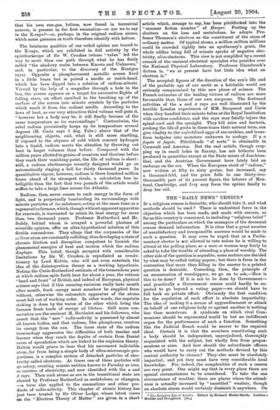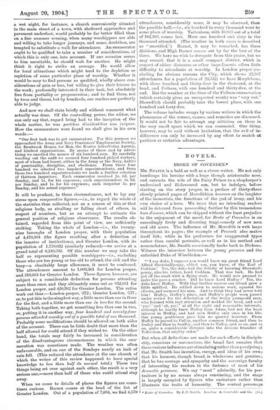Jr a religious census is desirable, who should take it,
and what methods should be used ? There is undoubted force in the objection which has been made, and made with success, so far as this country is concerned, to including "religious belief" among the particulars on which the managers of the decennial census demand information. It is clear that a great number of unsatisfactory and irresponsible answers would be made to such a question. It may even be urged that as a Parlia- mentary elector is sot allowed to vote unless he is willing to attend at the polling place, so a man or woman may fairly be asked to take the trouble of attending a place of worship. The other side of the question is arguable; some matters are decided' by what may be called voting papers; but there is force in the contention that more than filling in the answer to a printed question is desirable. Conceding, then, the principle of an enumeration of worshippers, we go on to ask,—How is this to be done ? If it is not to be done by Government—. and practically a Government census could hardly be ex- pected to go beyond a voting paper—we should have to fall back on private effort. Obviously the first condition for the regulation of such effort is absolute impartiality. The idea of making it a means of aggrandisement or attack on behalf of one religious body or against another is nothing less than monstrous. A syndicate on which rival Com- munions should be represented would be but an indifferent organ for the performance of such a function. Something like the Judicial Bench would be nearer to the required ideal. Certain it is that the members constituting such a body should be independent, unprejudiced, thoroughly acquainted with the subject, but wholly free from prepos- sessions or aims. And bow should the subordinate officers who would have to carry out the methods devised by this central authority be chosen? They also must be absolutely impartial; and yet they must have very considerable local knowledge. For, indeed, the complexities of such a census are very great. One might say that in every place there are special circumstances to be considered. To take the one circumstance of weather, there are places where the attend- ance is actually increased by " unsettled " weather, though an absolute storm would certainly diminish it anywhere. On a wet night, for instance, a church conveniently situated in the main street of a town, with sheltered approaches and pavement underfoot, would probably be far better filled than on a fine summer evening, when many worshippers are able and willing to take longer journeys, and some, doubtless, are tempted to substitute a walk for attendance. An enumerator
ought to be qualified to take a number of considerations, of which this is only one, into account. If one occasion seems to him unsuitable, he should wait for another. He might think it right to strike an average. He would allow for local attractions which might tend to the depletion or repletion of some particular place of worship. Whether it would be easy to find persons so qualified, wholly above con- siderations of gain or loss, but willing to give their leisure to the work; profoundly interested in their task, but absolutely free from partiality or prepossession ; and to find them, not by twos and threes, but by hundreds, our readers are perfectly able to judge.
And now we shall state briefly and without comment what actually was done. Of the controlling power, the editor, we can only say that, regard being had to the inception of the whole matter, be was partibus dissiclentibus non. iniquus. How the enumerators were found we shall give in his own words :-
"Our first task was to get enumerators. For this purpose we approached the Army and Navy Pensioners' Employment Society, the Bessbrook Homes for Men, the Keates Advertising Agency, and kindred organisations. By means of these and by adver- tising we enrolled the names of six hundred men. By carefully weeding out the unfit we secured four hundred picked workers, most of whom had learnt, either in the Army or the Navy, habits of punctuality, discipline, and obedience. From these four hundred wo selected two hundred superintendents, and from these two hundred superintendents we made a further selection of thirteen inspectors. Each enumerator received 2s. 6d. per Sunday, and is. for his expenses ; each superintendent 3s. 6d. per Sunday, and is. for his expenses ; each inspector 5s. per Sunday, and his actual expenses."
It will be prudent, in these circumstances, not to lay any stress upon comparative figures,—i.e., to regard the whole of the statistics thus collected, not as a census of this or that religious body, as rivalling or falling short of others, in respect of numbers, but as an attempt to estimate the general position of religious observance. The results ob-
tained, regarded from this point of view, are sufficiently striking. Taking the whole of London—i.e., the twenty- nine boroughs of London proper, with their population of 4,470,304 (the figure resulting after a deduction of
the inmates of institutions), and Greater London, with its population of 1,770,032 (similarly reduced)—we arrive at a
grand total of 6,240,336. Of this number we may take the half as representing possible worshippers—i.e., excluding those who a.re too young or too old to attend, the sick and the busy—a charitably large allowance, it must be confessed.
The attendances amount to 1,003,361 for London proper, and 510,664 for Greater London. These figures, however, are subject to a considerable deduction for persons attending more than once, and they ultimately come out as 832,051 for London proper, and 420,382 for Greater London. • The ratios work out thus :—London proper, '372; Greater London, '577; or, to put this in the simplest way, a little more than one in, three for the first, and a little more than one in two for the second. Taking both together, we get something less than one in two, or, putting it in another way, four hundred and seventy-four persons attended worship out of a possible total of one thousand. Probably some modifications should be allowed on both sides of the account. There can be little doubt that more than the half allowed for could attend if they wished to. On the other hand, the totals may fairly be increased in consideration of the disadvantageous circumstances in which the enu- meration was sometimes made. The weather was often unfavourable, and on one of the Sundays nearly an inch of rain fell. (This reduced the attendance at the one church of which the writer of this review happened to have special knowledge to less than half its normal total.) These two things being set over against- each other, the result is a very serious one,—more than half of those who could attend stay When we come to details of places the figures are some-
times curious. Barnet comes at the head of the list of Greater London. Out of a population of 7,604, we find 4,570 the possible half, six hundred in every thousand went to some place of worship. Tottenham, with 16,863 out of a total of 102,309, comes last: Here one hundred and sixty in the thousand attended. (The weather in both eases is described as "unsettled.") Barnet, it may be remarked, has three divisions, and High Barnet comes out by far the best of the three. We have no wish to derogate from this praise, but we may remark that it is a small compact district, which in respect of either distances or other impediments offers little difficulty to attendants at worship. In London proper (ex- cluding for obvious reasons the City, which shows 22,597 attendances for a population of 26,332) we have Marylebone, with three hundred and thirty-four in the thousand, at the head, and Fulham, with one hundred and thirty-five, at the end. But the weather at the time of the Fulham enumeration (which certainly gives an unexpected result) was "very wet." Shoreditch should probably take the lowest place, with one hundred and forty-five.
The volume includes essays by various writers in which the phenomena of the census, causes, and remedies are discussed. It would not be fair to attempt any criticism on these in the very small space which we can command. One thing, however, may be said without hesitation, that the evil of in- difference can only be increased by any effort to snatch at partisan or sectarian advantages.



































 Previous page
Previous page